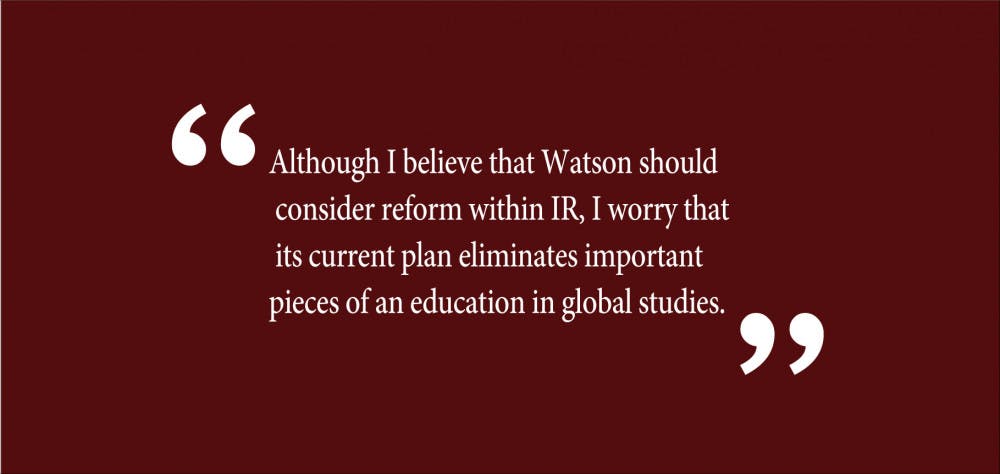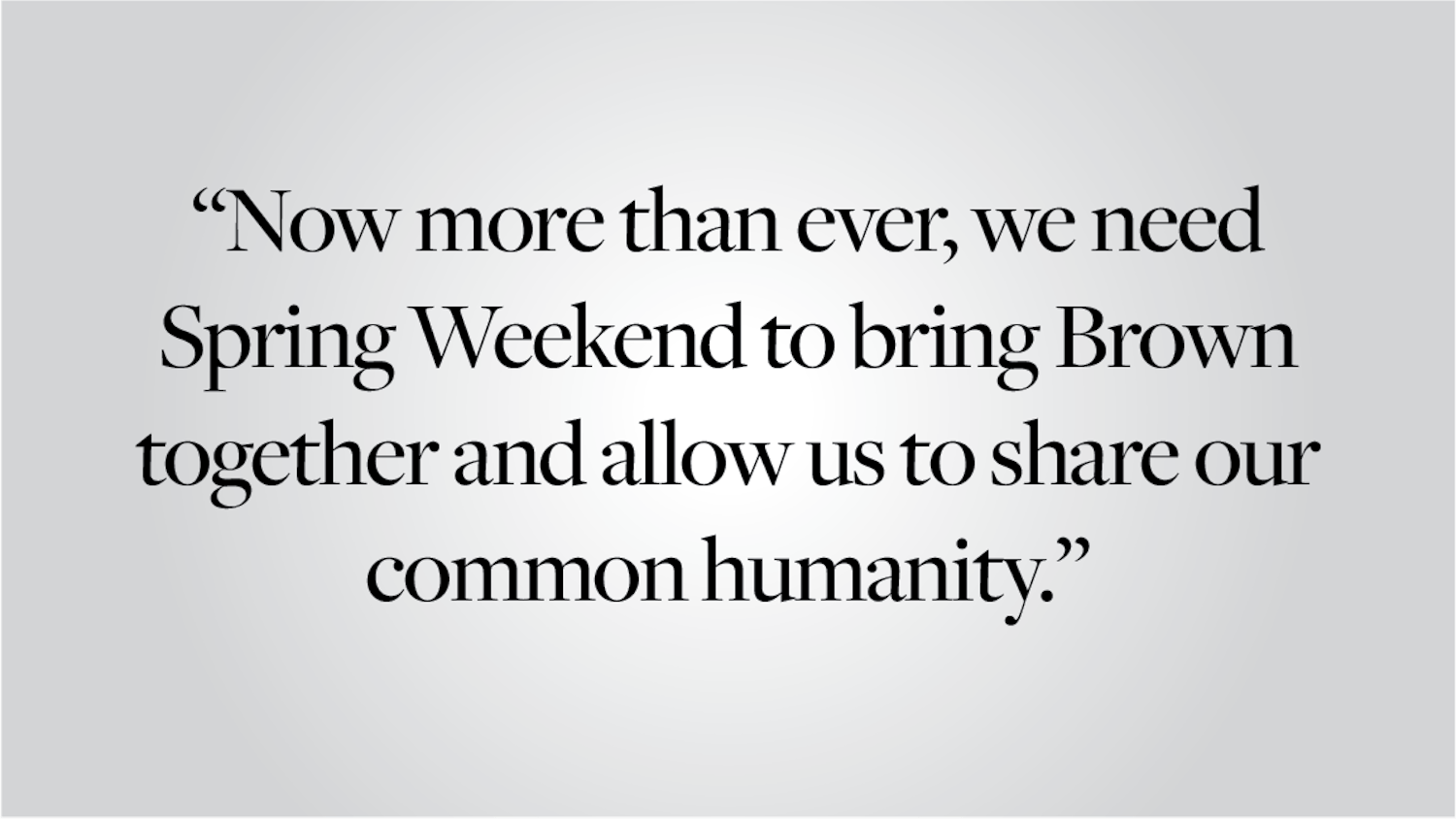To be honest, I have never been a passionate supporter of the International Relations concentration, and I have spent most of my time at Brown debating whether to continue my studies in IR or pursue a concentration in which I found fewer faults. Yet, as the Watson Institute of International and Public Affairs has submitted a finalized plan to combine International Relations, Development Studies and Public Policy into one conglomerate “International and Public Affairs” concentration, I feel it imperative to argue in favor of the concentrations’ continued individuality.
Although I believe that Watson should consider reform within IR, I worry that its current plan eliminates important pieces of an education in global studies. Specifically, I worry that the conflation of International Relations, Development Studies and Public Policy into one concentration undermines each discipline’s unique role in fostering an academic community and approaching politics through an interdisciplinary lens. In the process of streamlining Watson’s managerial work, IR concentrators will lose valuable components of their degree.
Development of a new concentration may indeed address certain flaws in the IR concentration as it currently stands. The phrase International Relations in and of itself connotes an outmoded Cold War era model of great power politics that privileges the role of elites and security institutions. Consequently, I believe that the IR concentration will better fulfill the needs of current Brown students with a title more like “International Affairs,” as suggested by Watson.
The new concentration proposal, however, permanently relegates invaluable courses and requirements to the concentration graveyard. The IR concentration currently mandates 14 requirements (15 with Honors) plus six semesters of modern language study. This means that I will take 21 courses for my concentration by the time I graduate, more than what I would need to receive an Sc.B. in a science concentration. In the process of reducing the required work to only 12 courses under the new concentration, Watson administrators have eliminated the five IR core courses. The core has been replaced with various Gateway Courses — introductory courses — and a nondescript foundational course for the student’s chosen track, whether Development, Security or Policy & Governance.
The IR core as it stands approaches global studies through a critical lens, dissuading concentrators from embracing more problematic narratives in the International Relations field. Two IR core classes, ANTH 0110: “Anthropology and Global Social Problems” and SOC 1620: “Globalization and Social Conflict,” specifically ask students to question the modern system of wealth inequality and the international capitalist order. By eliminating the IR core, Watson prepares students little to challenge global standards or create more effective solutions. Although under the new concentration a single course like “Nuclear Weapons and International Politics” would fulfill the same introductory requirement, I find it hard to believe that such a course would serve the same purpose in promoting discussion.
The new Watson concentration also removes all language requirements. While those who do take a language may opt out of a second methods requirement with four semesters of language study at Brown, this policy hardly encourages concentrators to learn valuable regional and language skills. I understand that this change is meant to incorporate Public Policy students whose focus remains in English-speaking realms, but this compromise greatly lessens the rigor of an education in IR.
I do believe the addition of a second methods course will positively contribute to a global studies education. But the ability for students to opt-out diminishes the efficacy of the new requirement, as many International Affairs students will likely continue to take language. Further, exchanging methods study for only four semester of language, instead of the current six required, does not optimize learning for students — as two years of language study will not leave you proficient.
Additionally, the proposal wrongly removes any requirement or incentive to take an economics course. The IR concentration currently has two tracks: Security and Political Economy. Although the new proposal includes its own “Security” track, Watson administrators have entirely removed the Political Economy track. Trade and commerce play an invaluable role in domestic politics and foreign policy; economics must be featured in any interdisciplinary public affairs education. The new concentration elicits no obligation for students to learn through this crucial lens.
Furthermore, Watson’s proposed changes overlook the fact that International Relations, Public Policy and Development Studies are all unique disciplines. I worry that the name “International and Public Affairs” will discourage students most interested in domestic policy from pursuing the Watson concentration. In line with this name, most courses included in the proposal emphasize foreign affairs at the expense of domestic policy. I would estimate that the Public Policy concentration did not double in size after the 2016 U.S. presidential election because students wished to explore international politics. Separate spaces for international and domestic policy serve different, yet equally important purposes. Forcing these two realms into one tight space may diminish their unique and essential roles.
In the spirit of Brown, Watson would accept any student with a passion for public affairs into this concentration, not requiring any sort of application beyond the standard declaration. In 2018, there were 116 students concentrating in International Relations, Public Policy and Development Studies. If all of these students joined the new concentration, it would prove difficult to build a sense of academic camaraderie among such a large number of concentrators. This is especially true since under the new proposal, not one single course is required for all Watson undergraduates.
I hold that the combined Watson concentration would remove valuable components of the IR concentration as it stands — with negative consequences for the core, language requirement and study of economics. By privileging international affairs, the new concentration also undermines the value of a focus on domestic policy essential to many public policy concentrators.
I have never found IR to be infallible, and many areas the proposed plan tackles — such as greater access to faculty and a second methods requirement — should be applauded. However, fixing the problems inherent to the concentration does not require its entire eradication. Watson should pursue a less drastic option in pursuit of a better IR.
Olivia Hinch ’20 can be reached at olivia_hinch@brown.edu. Please send responses to this opinion to letters@browndailyherald.com and other op-eds to opinions@browndailyherald.com.





